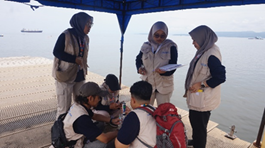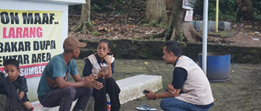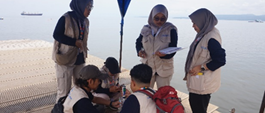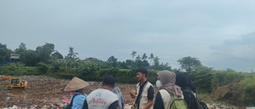
Gadjah Mada University Master of Environmental Management (MPL) students class 45-46 carried out Field Work Lectures (KKL) which were held in Banyuwangi on January 20th – 24th 2025. This activity was accompanied by Dr. Langgeng Wahyu Santosa, S.Si., M.Sc., as KKL Coordinator, Dr. Agus Joko Pitoyo, S.Sc., M.A., as Group A supervisor, and Dr. Sigit Heru Murti BS, S.Si., M.Si., as Group B supervisor.
The first day of the activity began with a visit to the Banyuwangi Regency Environmental Service (DLH) to stay in touch and get an introduction to Banyuwangi. Then the activity continued with plotting per group. MPL students visit each predetermined location and conduct abiotic, biotic and cultural research.
The locations visited by group A on the first day were Ketapang Springs, Bangsring Beach and Cemara Beach. The people of Ketapang Village believe that the name “penawar” was given because the springs in the area have special qualities related to the context of healing (antidote to diseases). This belief, which is classified as mystical logic, actually becomes a cultural catalyst that can encourage people to conserve natural resources in the form of springs in a sustainable manner.
Based on the results of field observations at Bangsring Beach, coral reef restoration efforts from 2008 to 2025 have produced a significant and balanced impact both in terms of ecology and the creation of new economic opportunities for coastal communities in Bangsring Village. In fact, people have started to be moved to preserve aquatic biota such as sharks. The research results obtained at Cemara Beach are that shrimp ponds at Cemara Beach provide socio-economic contributions to the community, but still face challenges in managing waste which has the potential to pollute the environment.
Group B visited the Karangbendo TPA, Pancoran TPA, Tegalwaru TPA, Shrimp Pond, Cemara Beach (turtle conservation). The first visit made by group B was to the Karangbendo landfill which was no longer active. This is an action to reject the existence of a landfill around their area because during the rainy season the smell disturbs local residents, therefore the residents take action to backfill and close the landfill.
The visit continued to the Pancoran TPA, which is an active landfill. On average, 31 trucks are dumped at the Pancoran TPA per day. Next to Tegalwaru TPA. This TPA is no longer active and has been successfully converted into agricultural land since Covid-19.
“The 2025 Field Work Study really provides many benefits for me and other friends. There is a lot of knowledge and insight gained from this field lecture, this field work lecture is also a forum for applying the knowledge that has been learned in class. “Also, my friends and I can learn about the problems faced by society,” said Lisa Andini, MPL student
Tags: environmental management, fieldwork lectures, community service, conservation, aquatic biota, SDG 4: quality education, SDG 6: clean water and adequate sanitation, SDG 8: decent work and economic growth, SDG 9: industry, innovation and infrastructure, SDG 12: responsible consumption and production, SDG 14: ocean ecosystems, SDG 15: land ecosystems
Author: Siti Muyasaroh



